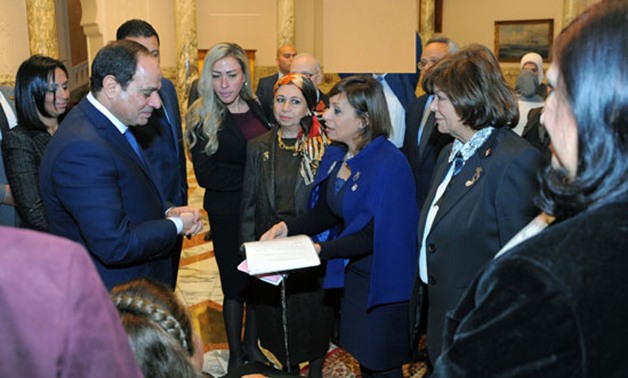
Egyptian President Abdel Fatah Al-Sisi, Maya Morsy along with the National Council of Women Members - Egypt Today
CAIRO – 25 December 2017: President Abdel Fatah al-Sisi announced earlier this year that 2017 will be the "Year of the Egyptian Woman". Such an important announcement indicates the value of Egyptian women in society as partners in building Egypt. Both the president and the government hope to make a major leap forward in the rights and lives of Egyptian women.
What major women's issues has Sisi addressed in the last year? To what extent has the status of Egyptian women improved? What exactly happened in the “Year of Egyptian Woman”? Egypt Today gives a detailed summary, reflecting on what changed for women in Egypt in 2017, presented by Maya Morsy, the president of the National Council of Women.
The privileges the Egyptian president gave to Egyptian women in "Women empowerment 2030" strategy
Morsy said that President Sisi announced 2017 to be the year of women. This was the first step towards calling on all the government agencies and civil society to put into place a policy specifically dedicated for Egyptian women. "This policy was translated to a strategy titled Women empowerment 2030, which is now a policy for the Egyptian government to work on," recounted Morsy. She explained that this strategy was announced on March 8, 2017. The president directed all government agencies to make sure that this is the road map for the way ahead. "We are receiving all the information and plans from the ministries and governmental agencies. Up to this point we received about 38 plans related to 2030 women empowerment agenda," Morsy added.
Morsy elaborated that the strategy has four main pillars, which are women political participation, economic participation, social empowerment and protection. Legislation is a cross cutting agenda that is on all the four pillars. "The other cross cutting issues are raising awareness, as well as changing culture and ideas, because we cannot achieve all this without making sure that the social environment is ready to receive all the messages we are sending,’’ Morsy pointed out.
Morsy further explained that the president gave directions to allocate LE 250 million for the small enterprises completely dedicated to women, 50 million for the infrastructure of the poor, vulnerable and neediest women and 250 million to be directed to kindergartens and nurseries. One of the major obstacles that hinder women’s work is the lack of childcare support. "We are calling on women to go to work; there is a need for women's economic participation. All the studies have shown that if women participate in the economic sector, the Egyptian GDP will increase by 34 percent, so if we want to achieve the targeted increase in the Egyptian GDP, we have to develop women's infrastructure," Morsy added.
Positions held by women for the first time in 2017
Morsy admitted that we are now witnessing the year of women breaking the glass ceiling by the appointment of the first woman governor ever in Beheira governorate; Nadia Abdou. Also, we have a female National security advisor for the president for the first time in the Egyptian history named Fayeza Aboul Naga. "These two posts were never held by women, so if we see more women in such posts, we will create a belief in the society that Egyptian women are successful. Second, we will stop linking that National security issues to men only or say that men only are able to be governors," Morsy illustrated.
Morsy explained that in the year of women, Egypt has the first female deputy to the president of the Central Bank of Egypt. In addition, more women held judiciary posts in 2017; we have six women in the judiciary sector and the first ever female deputy to the minister of tourism. "There is a major change; posts that were never given to women are now given to women. This is the first step towards changing ideas," Morsy concluded.
Morsy noted that the NCW also worked in the year of women to form a group of women religious leaders; Christians and Muslims. NCW cooperated pertaining this issue with the ministry of Awkaf (Endowments) and the three main Egyptian churches. "These religious women are touring all the Egyptian villages and governorates as part of the 'Knocking doors' campaign which is based on going to the Egyptian women in their houses."


Comments
Leave a Comment